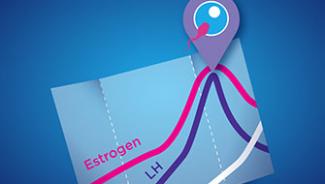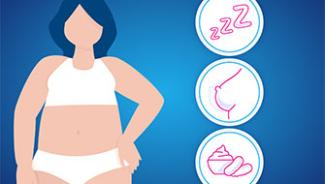Six things to do (and six to avoid) during the two-week wait

If you’re trying to conceive, you’re probably familiar with the two-week wait, those often slow-moving, emotion-filled days of wondering if you’re pregnant or not. Here we talk about what the two-week wait really is, if two-week-wait symptoms are a thing, and what to do (and not do) while you wait.
What is the two-week wait?
The two-week wait (TWW) is the amount of time between ovulation and the day of your expected period (typically, it’s about two weeks, but this can vary). Why wait? Well, if conception has occurred, it takes a little while for hCG (human Chorionic Gonadotropin) to reach levels high enough to be detected on a pregnancy test. The timing of when to take a pregnancy test is important, and the instructions that come with the test you’re using should walk you through when to use it.
Are there two-week wait symptoms?
Many PMS and early pregnancy symptoms can be very similar, so the way you’re feeling during the two-week wait isn’t a reliable indicator of potential pregnancy. But there are symptoms during the two-week wait that are specific to early pregnancy.1 Two-week-wait symptoms that may signify early pregnancy include light vaginal bleeding or spotting,2 nausea with vomiting and, eventually, a missed period.1
Want to know what to do during the two-week wait? Here are six things to occupy your time.
Do: Educate yourself thoughtfully.
Chances are you’re going to look things up online (you’re here, aren’t you?). The key is to choose articles that are helpful for you right now, like learning more about home pregnancy tests. Here are some topics to get you started:
- Home pregnancy tests: Your most pressing questions answered
- Can certain foods and drinks affect a pregnancy test result?
- Can you mess up a pregnancy test?
- How many pregnancy tests should you take?
- Fun ways to make the most of the 3 minutes while you wait for your pregnancy test results
Do: Move your body in a healthy way for you.
While now may not be the best time to start a new, vigorous exercise routine, if your doctor approves, try to maintain your current regimen if you have one.3 If you don’t exercise regularly, take some time for a little more mindful movement, and consider what kind of exercise might suit you. Walks, hikes or yoga can be great places to start. Take time to learn more about safe exercise while trying to conceive and talk to your doctor about a personalized fitness plan that’s best for you.
Do: Take that daily prenatal vitamin your doctor told you about.
If you aren’t already taking a prenatal vitamin with 400 to 800 mcg of folic acid every day, now’s the time to start.4 Getting enough folic acid can help reduce the risk of some birth defects (e.g., neural tube defects such as spina bifida).4 Your doctor can help you find the right vitamin for you to make sure you’re getting enough of everything your body needs.
Do: Stay busy.
Time can play tricks on you when you want it to move more quickly. Fast-forward your way through the next 14 or so days by giving yourself something to focus on and look forward to, like a day or weekend trip halfway through. Consider tackling a light home or DIY project, or hosting a get-together with friends. Whether you prefer socializing or solo activities, scheduling a time to do something you’ll look forward to can help pass the time more quickly.
Do: Try using timers to deal with stress.
If you’ve already searched “Could I be pregnant?” on the internet 20 times today or find yourself focusing on “research” rabbit holes that are stressing you out, it may be time to make a change. Try setting a timer to give yourself a certain amount of time to look up anything pregnancy-related online. Once the time is up, find something new to do. The same strategy can work if you frequently feel anxious or worried during the TWW: Give yourself a block of time each day to sit with and experience those feelings, and when the time is up, let yourself focus on other things (ideally, things that you enjoy!).
Do: Set boundaries and surround yourself with love.
If you think you might be pregnant, or you’re trying to conceive (TTC), be mindful about who you tell — and when. Deciding who to tell (and how much to tell them) is an important part of setting boundaries while trying to conceive. Think about who you will want to share the results with, no matter the outcome, and who you’ll feel comfortable sharing your feelings with. And if you don’t want to talk about TTC or the TWW with someone you’re close with, that’s OK too! Letting others be there for you (whether they know you’re TTC or not) can help you feel supported and loved by the people who care about you most.
Want to know what not to do during the two-week wait? Here are six things to avoid.
Don’t: Smoke, drink or use recreational drugs during the two-week wait.
If there’s a chance you could be pregnant, don’t smoke or drink alcohol.4 There is no known safe amount of alcohol you can drink while pregnant.5 Smoking while pregnant increases the chance of miscarriage and of having a baby born with a low birth weight.5 Babies born to people who take illegal drugs while pregnant may be born addicted and must go through withdrawal.5 Your doctor can provide resources to help you stop smoking, drinking or taking drugs — now is the best time to take these steps.
Don’t: Overanalyze potential signs of early pregnancy.
We get it — it can be hard not to wonder if your headache, backache or changes in appetite or mood are related to PMS or pregnancy. It’s normal to start paying extra close attention to how you feel when you’re wondering if you might be pregnant. But while symptoms like fatigue can be a sign of early pregnancy, it can also be a sign your period is almost due. Allow yourself to notice how you’re feeling, but let go of needing to know right now whether it’s a sign you’re pregnant. Of course, if you feel unwell or are concerned something is wrong, don’t hesitate to reach out to your healthcare provider!
Don’t: Get stuck in negative thinking.
The first step in avoiding this all-too-common trap is to recognize it’s happening. If you’ve been trying to conceive for a while, remember that the past doesn’t dictate your future. There are lots of ways to surround yourself with positivity, from choosing to spend time with people you love, to spending time in your favorite spaces, to doing things that bring you joy. And don’t be afraid to ask for help if negative thoughts are getting you down! Seeking support from a professional can make a big difference and help you feel better.
Don’t: Be tempted to trust myths.
There’s a lot of bad science and misinformation in this world, and when you’re wishing and hoping for an answer, it can be tough to stick to fact checking. Separate the myths from facts when it comes to fertility nutrition and don't be tempted to try a DIY pregnancy test. It can feel disappointing in the moment, but it’s good to remember that if a “tip” or “hack” sounds too good to be true, it probably is.
Don’t: Test too early.
When you test for pregnancy depends on where you are in your menstrual cycle and the pregnancy test you’re using. Clearblue® Early Detection Pregnancy Tests can detect 77% of pregnant results 6 days before your missed period (5 days before your expected period).6 Learn more about how soon is too soon to take a pregnancy test.
Don’t: Feel guilty for how you feel.
This includes not feeling guilty for not following a do-and-don’t list like this one! Most of these are gentle guidelines, nothing more. Even if you did everything you could to emotionally prepare for trying to get pregnant, the two-week wait can be difficult. Remember that you’re not alone in your feelings while TTC. You know yourself best — so do what’s best for you. The time will, eventually, pass.
Sources :
- The American College of Obstetricians and Gynecologists. Changes during pregnancy. Accessed January 18, 2023. https://www.acog.org/womens-health/infographics/changes-during-pregnancy
- The American College of Obstetricians and Gynecologists. Bleeding during pregnancy. Updated August 2022. Accessed January 18, 2023. https://www.acog.org/womens-health/faqs/bleeding-during-pregnancy
- The American College of Obstetricians and Gynecologists. Exercise during pregnancy. Updated March 2022. Accessed January 18, 2023. https://www.acog.org/womens-health/faqs/exercise-during-pregnancy
- U.S. Department of Health & Human Services: Office on Women’s Health. Prenatal care. Updated February 22, 2021. Accessed January 18, 2023. https://www.womenshealth.gov/a-z-topics/prenatal-care
- U.S. Department of Health & Human Services: Office on Women’s Health. Staying healthy and safe. Updated February 22, 2021. Accessed January 18, 2023. https://www.womenshealth.gov/pregnancy/youre-pregnant-now-what/staying-healthy-and-safe
- Clearblue® Early Detection Pregnancy Test provides early detection of the pregnancy hormone (hCG). 77% of pregnant results can be detected 6 days before your missed period (5 days before your expected period).

How to use a pregnancy test
When and how you can test depends on the test you use, but in this article you will find everything you need to know before starting a test.

How to get pregnant faster
There are a few key things you need to know if you want to maximise your chances of getting pregnant.

What are the early signs of pregnancy?
There are various symptoms that can indicate you might be pregnant, even if you might not experience any/all of them.




